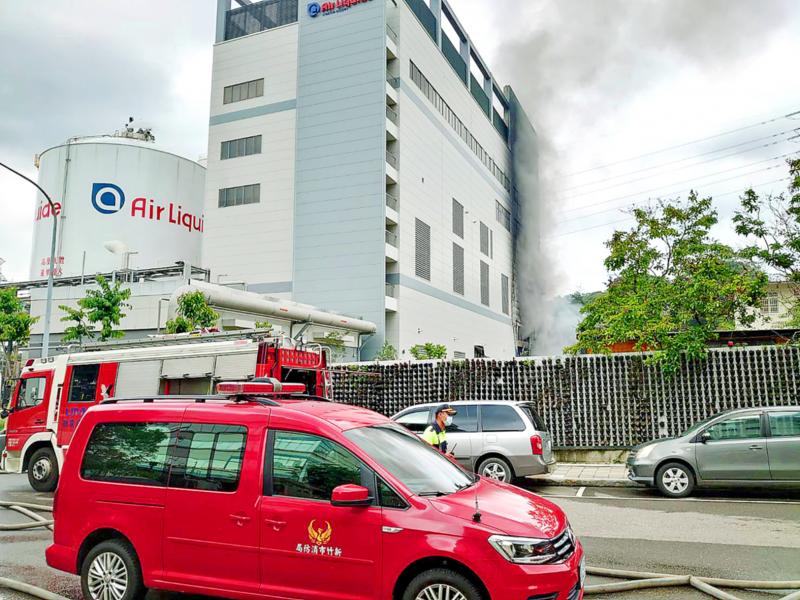A fire that broke out at Air Liquide Far Eastern Ltd’s (ALFE, 亞東工業氣體) plant in the Hsinchu Science Park (新竹科學園區) yesterday morning was likely caused by malfunctioning transformer units, the Hsinchu Fire Bureau said.
The blaze was extinguished at about 12:30pm, and no injuries were reported, the fire bureau said.
Seventy firefighters and 20 trucks were deployed to the site to put out the fire, which likely stemmed from overheating transformer equipment on the first floor of the six-floor ALFE building before spreading to the second floor, the bureau said based on a preliminary investigation.

Photo: CNA
Lin Tsai-hsuan (林采煖), an assistant manager at ALFE, said that staff in the building evacuated after the fire was reported at about 10am.
The ALFE facility at the Hsinchu Science Park is nearing completion after construction began in November 2020, she said, adding that the site is still in its testing phase.
The joint venture between France’s Air Liquide SA and Taiwan’s Far Eastern Group (遠東集團) provides natural gas supplies and services for Taiwanese electronics and medical industries, among others, in addition to homes.
The Hsinchu plant is being built to meet growing demand for natural gas among Taiwan’s semiconductor manufacturers, Lin said.
Hsinchu Science Park Bureau Deputy Director-General Chen Shu-chu (陳淑珠) said the fire caused a temporary voltage drop at the park, but no power outage occurred.
Taiwan Semiconductor Manufacturing Co (台積電) said that operations at its Hsinchu site were not affected by the incident, while Powerchip Semiconductor Manufacturing Corp (力積電) said its production was only partially interrupted, as some of its equipment did not have generators as backup.

Three experts in the high technology industry have said that US President Donald Trump’s pledge to impose higher tariffs on Taiwanese semiconductors is part of an effort to force Taiwan Semiconductor Manufacturing Co (TSMC, 台積電) to the negotiating table. In a speech to Republicans on Jan. 27, Trump said he intends to impose tariffs on Taiwan to bring chip production to the US. “The incentive is going to be they’re not going to want to pay a 25, 50 or even a 100 percent tax,” he said. Darson Chiu (邱達生), an economics professor at Taichung-based Tunghai University and director-general of

‘LEGACY CHIPS’: Chinese companies have dramatically increased mature chip production capacity, but the West’s drive for secure supply chains offers a lifeline for Taiwan When Powerchip Technology Corp (力晶科技) entered a deal with the eastern Chinese city of Hefei in 2015 to set up a new chip foundry, it hoped the move would help provide better access to the promising Chinese market. However, nine years later, that Chinese foundry, Nexchip Semiconductor Corp (合晶集成), has become one of its biggest rivals in the legacy chip space, leveraging steep discounts after Beijing’s localization call forced Powerchip to give up the once-lucrative business making integrated circuits for Chinese flat panels. Nexchip is among Chinese foundries quickly winning market share in the crucial US$56.3 billion industry of so-called legacy

Taiwan Semiconductor Manufacturing Co (TSMC, 台積電) yesterday held its first board of directors meeting in the US, at which it did not unveil any new US investments despite mounting tariff threats from US President Donald Trump. Trump has threatened to impose 100 percent tariffs on Taiwan-made chips, prompting market speculation that TSMC might consider boosting its chip capacity in the US or ramping up production of advanced chips such as those using a 2-nanometer technology process at its Arizona fabs ahead of schedule. Speculation also swirled that the chipmaker might consider building its own advanced packaging capacity in the US as part

A move by US President Donald Trump to slap a 25 percent tariff on all steel imports is expected to place Taiwan-made steel, which already has a 25 percent tariff, on an equal footing, the Taiwan Steel & Iron Industries Association said yesterday. Speaking with CNA, association chairman Hwang Chien-chih (黃建智) said such an equal footing is expected to boost Taiwan’s competitive edge against other countries in the US market, describing the tariffs as "positive" for Taiwanese steel exporters. On Monday, Trump signed two executive orders imposing the new metal tariffs on imported steel and aluminum with no exceptions and exemptions, effective